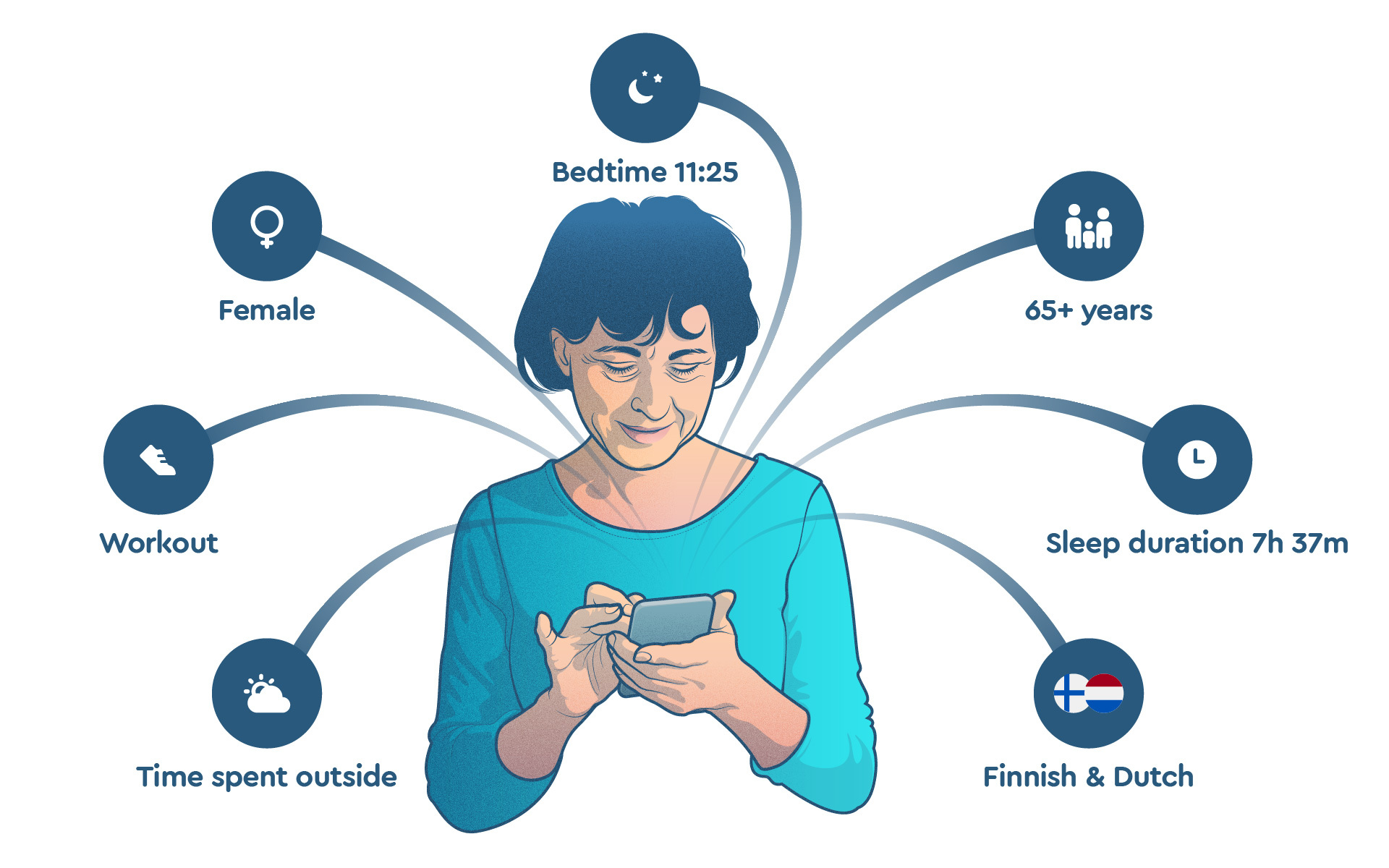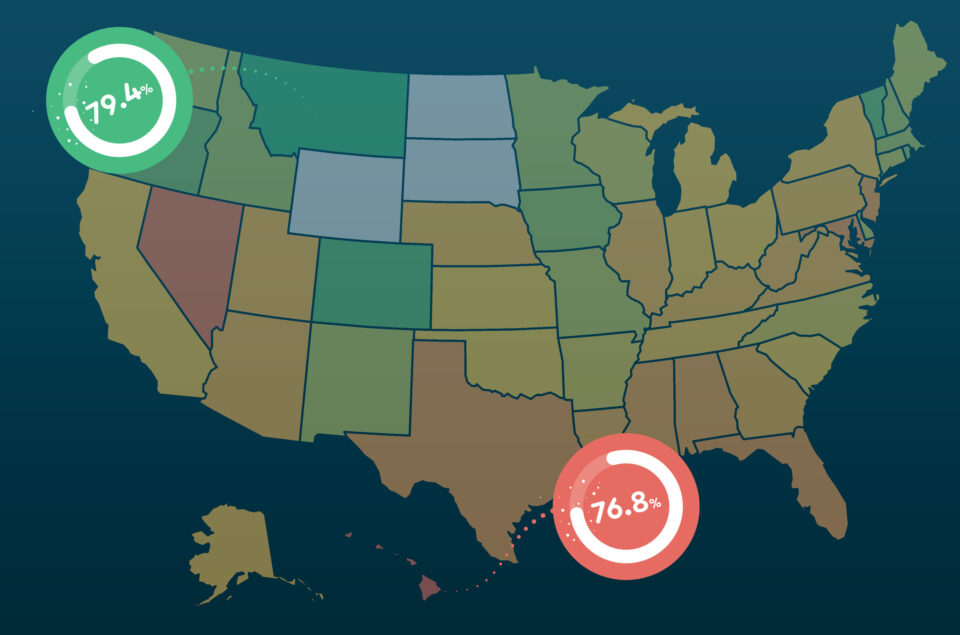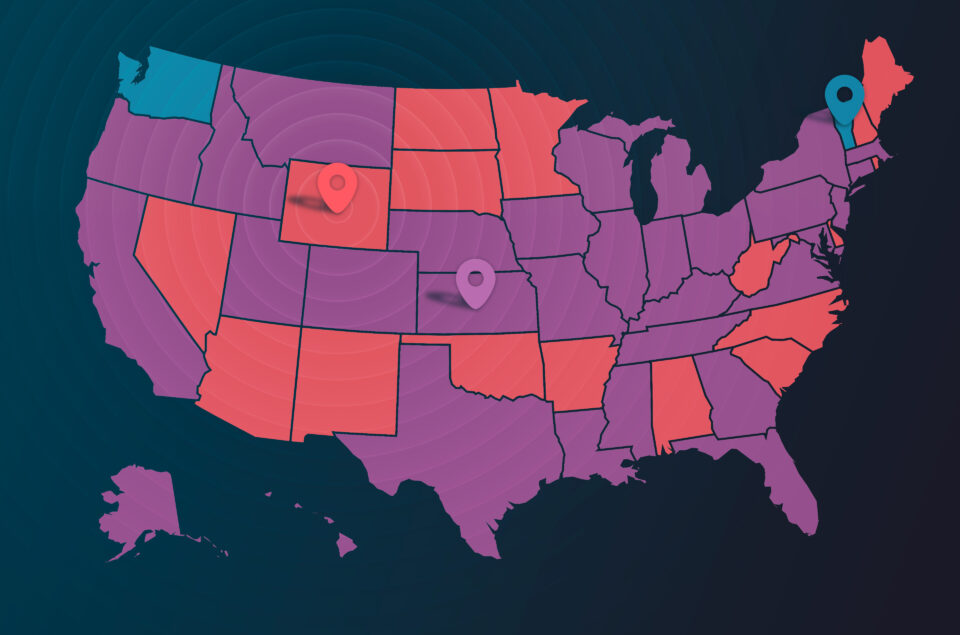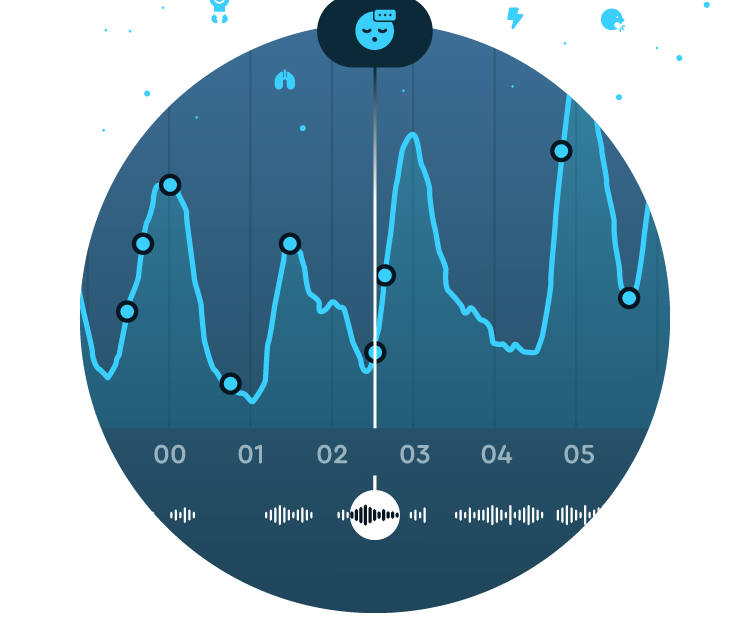A popular and recurring question we come across at Sleep Cycle is: What habits and routines do our users employ, especially those users that count amongst our best sleepers? Our best sleepers (based on their sleep quality) actually do have a few KEY things in common. Join us to learn more and get some practical advice on how you can become a better sleeper – perhaps even better than our best.
Sleep Cycle’s users and their habits
The Sleep Cycle app has more than two million active monthly users, and to select our best sleepers, we looked at data from users that voluntarily and anonymously agreed to share their sleep data with us. In this report, we analyzed data shared by these users during 2021, for a total of over 85 million nights of sleep. With this data, we were able to identify how sleep varies by age, gender and geography; and what habits our good sleepers have in common.
Our best-rested people, according to the data and some of the factors that contributed to their sleep were:
- They worked out. Our sleepers who exercise simply seem to enjoy better sleep, regardless of gender or age. They also report waking up in the best mood (60/100).
- They spend time outside. When our sleepers spend time outside they average 13 more minutes of sleep and wake up in a better mood (58/100).
- They belong to the age group 65 or above. When our sleepers reach the age of 65 or above, they average 13 more minutes of sleep and wake up in a better mood (58/100).
- Gender – Women have a higher quality of sleep. Women come out at (74 percent) and men (72 percent).

Carry on dreaming...
As we dug deeper into why our female users seemed to enjoy a higher quality of sleep, a few key trends emerged.
- Women went to bed earlier. Women (11:44 p.m.) tuck in 9 minutes earlier than men (11:53 p.m.).
- Women spend more time in bed. Women (7 hours and 13 minutes) are in bed 17 minutes longer than men (6 hours and 56 minutes).
- Women wake up later. Women (7:43 a.m.) wake up about 10 minutes later than men (7:32 a.m.)
- Women snore less. Could this contribute to a higher quality of sleep? That’s just our wild guess, but the data does show that men snore 8 minutes and 30 seconds more. If you suspect snoring is disturbing your sleep, using a sleep tracker to capture your sleep sounds and possible snoring can be of help to understand whether treatment is needed.
- Women have fewer nightly wake-ups.
- Age. Women in the age bracket 55-74 years, spent the most time in bed.
It also seems that early bedtime — independent of sleep duration — correlates with other positive outcomes. Our sleepers who wake up in the best mood go to bed the earliest (11:25 p.m.) and average 7 hours and 37 minutes of sleep.
How do you become a better sleeper?
So with the information above, how can we aspire to become better sleepers and adopt best practice sleep routines? Through our Boot Camp Sleep Program we meet several participants who have questions regarding best sleep practices. We’ve summarized the most frequent questions below and given our best shot at addressing them. The answers will also hopefully give you handy tips to incorporate into your own bedtime routine.
What is a ‘good’ sleep schedule?
As you may have guessed, a good sleep schedule is clearly one that works for you and also that keeps in mind and is adapted to your sleep chronotype. So if you’re an evening person and prefer a later morning, that’s perfectly ok, the key is to ensure you’re not cutting down the hours you sleep, if you enjoy late nights.
The recommended amount of hours for healthy adults is between 7-9 hours of sleep during a night. And also to keep the routine as regular as you can, so if you prefer going to bed at 11 pm and waking up at 7 am and you feel rested with that amount of sleep – stick to it! At Sleep Cycle we’ve noted that during weekdays, Sleep Goal’s default setting and also the most popular sleep schedule timing is 10 pm-6 am. (Sleep Goal is a feature where users can set a sleep schedule and sleep goal for themselves.)
What are the best things to do before sleeping?
An excellent guide to read, is our 10 habits for better sleep. Often the things you can do to promote better sleep at nighttime, begin in the day and not necessarily just before going to bed. For example:
- Caffeine should be limited earlier in the day to ensure it’s not delaying the onset of sleep.
- A walk during the day to get exposure to sunlight has a powerful effect on the body clock and will help you find sleep more easily at nighttime.
- Exercise is another example of something that should be scheduled earlier in the day. Heavy exercising too close to bedtime will risk leaving you too wired to fall asleep with ease.
- Helpful habits to employ just before bedtime can instead include relaxation exercises, winding down technology usage a couple of hours before bed, and creating a calm, clutter-free zone in your bedroom.
How to incorporate a ‘good’ sleep schedule?
To create a big change overnight, start with small steps during the day. Some might be quite hard to control, but some things are actually things we can do, such as perhaps shifting your schedule in small increments till you manage to achieve a relatively regular bed- and wake-up time. Incorporating even just a 15-minute wind-down routine can do wonders to help you achieve better sleep quality.
What month do people sleep the least?
The month when people sleep the least is….drumroll….February….get it? ‘Cos it has the least number of days….sorry – we couldn’t resist this one!
What’s the ‘best’ bedtime and wake-up time?
As mentioned above, at Sleep Cycle, our user data shows that on average our users tend to keep to these hours: Women on average go to bed at 11:44 p.m. while men go to bed at 11:53 p.m. Women (7:43 a.m.) wake up on average at 7:43 a.m. while men wake up 10 minutes earlier at 7:32 a.m.
It’s important to remember that these times don’t necessarily mean these will be the best times for when you should be hitting the sack and getting up in the morning. However, it leans into the general assumption, that early to bed, and ensuring enough sleep will ultimately help improve your sleep quality.
Lights out!
Our data tells us that sleep patterns continuously change as we age and – take comfort in this – often for the better. Reported wake-up mood improves as we age and even if we’re creatures of habit, our data show that men for example go from being the last to bed to being the first at later stages in life. At age 18-34, men are last to bed (11:57 p.m.), but by age 55, they are now first to bed at 11:07 p.m. overtaking women.
Sleep not only varies by age, gender and health but is also influenced by social, cultural, and environmental factors. These are just some of the many interlinked reasons and probable contributors to a good night’s sleep.
Curious to know which nationality out of our vast user groups, reported the highest quality of sleep? Our Finnish and Dutch users tie for first place with the highest quality of sleep at 78%. However our users in the western hemispheres can take heart, as our Mexican, Dominican and Costa Rican users report the best wake-up mood!










